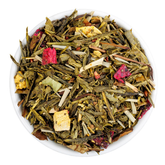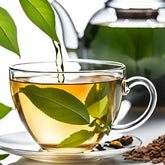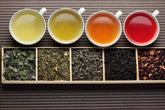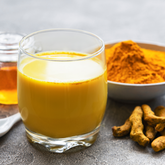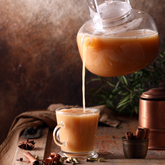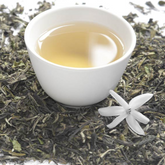Top immune boosting teas include turmeric teas, ginger teas, licorice root teas, peppermint teas, chamomile teas, and more.
These teas contain beneficial properties that can help to strengthen your immune system and ward off illness. Whether you’re worried about flu season, or just want to improve your overall health, many people turn to tea for its medicinal effects.
Tea and the immune system
Tea is great for your immune system, high in antioxidants, and a great source of hydration. Many types of tea also have antiviral and antibacterial properties that can help to prevent you from getting sick. If you’re afraid you’ve already caught a bug, tea can also help to soothe your body and ease symptoms while you recover.
While tea is full of health benefits, it isn’t a replacement for professional medical treatment if you think you might be sick. You should always seek the help of a medical professional if you think you’re suffering from a serious illness. That said, tea has been used in herbal medicine to treat minor illnesses for hundreds of years - and recent studies back up tea’s panacea status with scientific evidence. These are a few of the teas that are especially effective when it comes to boosting your immune system’s defenses and improving overall health:
1. Turmeric teas
Turmeric is a bright orange root with a slightly bitter flavor that is related to ginger and often used in Indian cuisine. Turmeric contains a compound known as curcumin, which contains antimicrobial properties and can help to ward off illness.
2. Ginger teas
Like turmeric, ginger also contains antimicrobial properties that can help to boost your immune system and keep you safe and healthy. Ginger imparts a slightly sweet, slightly spicy flavor to tea blends, and is a popular ingredient in both caffeinated and herbal teas.
3. Licorice root teas
Licorice root imparts a subtle sweetness to any tea its added to. Used in Chinese herbal medicine for hundreds of years, licorice root has a wealth of health benefits, including antiviral and antimicrobial properties that can help to boost your immune system and keep you from getting sick.
4. Peppermint teas
Peppermint is another popular herbal tea that can be consumed on its own or as an ingredient in both caffeinated and herbal blends. Peppermint is cool, minty, and soothing - the perfect thing when you’re feeling under the weather. Studies have shown that peppermint has antimicrobial and antiviral properties that can help ward off illness, and it’s also high in antioxidants along with a variety of other health benefits.
5. Chamomile teas
Chamomile has been used as a component of herbal medicine for centuries to help boost the immune system, soothe symptoms of the common cold, and aid in rest and relaxation. While studies concerning chamomile’s many benefits are still ongoing, recent research indicates that chamomile may contain antibacterial properties that can help to ward off illness and keep your immune system in tip-top shape. Chamomile can be consumed on its own for a mild, floral tea that goes great with a dollop of honey, and it’s also a popular ingredient in a variety of herbal blends.
6. Lemongrass teas
Lemongrass is a common ingredient in a variety of tea blends that has a pleasant citrus flavor. Recent studies have shown that lemongrass has antibacterial properties that can help to protect the body against illness. Lemongrass is also high in antioxidants and can help to reduce inflammation.
7. Hibiscus teas
Teas that include hibiscus contain antibacterial and antimicrobial properties that can help to ward off illness and promote overall health. Hibiscus also has many other health benefits including high levels of iron, antioxidants, and Vitamin C.
8. Black tea
Black tea contains catechins with antiviral properties that can help to keep you from getting sick. Like other types of tea made from the camellia sinensis plant, black tea is high in antioxidants and has a variety of other health benefits, like soothing inflammation and boosting heart health.
9. Green tea
Green tea is made out of the same tea plant that black tea and other types of caffeinated tea are produced from. Unlike other types of tea, green tea is either steamed or pan-fired soon after harvest in order to halt the oxidation process, which preserves the green color of the tea leaves and may also result in increased levels of beneficial compounds like antioxidants and catechins. Studies show that the catechins present in green tea can help to ward off the flu and the common cold.







